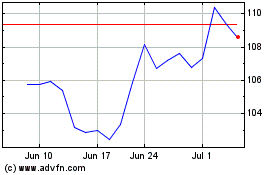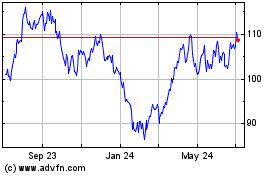Today's Top Supply Chain and Logistics News From WSJ
February 16 2017 - 7:11AM
Dow Jones News
By Paul Page
Sign up:With one click, get this newsletter delivered to your
inbox.
U.S. agriculture exporters may be concerned about tough talk on
trade, but they're not seeing the impact in overseas markets. The
chief executive of Bunge Ltd., one of the world's big commodities
traders, tells the WSJ's Jacob Bunge the balance between price and
supply remains the major factor that purchasers of U.S.-grown crops
consider in moving goods around the world. Agricultural traders
have watched warily as Mr. Trump ratcheted up criticism of trade
policies, and some are looking at the risks to their supply chains.
Archer Daniels Midland Co. says it is prepared to adjust its
grain-processing operations in the event of new trade waves. Recent
figures from U.S. ports suggest exports are steaming ahead: the
ports of Los Angeles and Long Beach reported a combined 20.5%
year-over-year increase in outbound flows in January. Still, the
volume was down from the previous three months, a slowdown that may
get the attention of some exporters.
Manufacturers of pickup trucks have special reasons to be
worried if the U.S. scuttles the North American Free Trade
Agreement. Companies including General Motors Co., Toyota Motor
Corp. and Fiat Chrysler Automobiles NV could see the immediate end
to an exemption from a 25% duty the U.S. imposes on all pickup
trucks and some work vans produced outside the country, the WSJ's
Robbie Whelan reports. The exemption to what's known colorfully as
the "chicken tax" is included in Nafta, and trade experts say it
would disappear if the trade agreement is gutted -- highlighting
the way Nafta's many provisions have been embedded into the costs
of products. The tax originated in a trade dispute between the U.S.
and West Germany back I the 1960s over American poultry exports.
For pickup truck makers and buyers, dropping it would amount to
more than chicken feed: Last year through November, the U.S.
imported $18.5 billion worth of vehicles from Mexico that would be
subject to the tax.
The U.S. business community in China is starting to line up
behind calls for a tit-for-tat approach with Beijing on trade and
investment. After years of caution, the WSJ's Mark Magnier and Josh
Chin report, the companies are embracing some of the Trump
administration's tough talk in hopes of gaining better access to
China's markets. Shipping and logistics companies would certainly
like better access. Many Western freight operators that once sought
big returns in China have tamped down investment and expectations
as they've grown frustrated along with other companies at the
country's restrictive industrial and economic policies. Now, the
American businesses say they want reciprocity. Some point as an
example to Chinese e-commerce giant Alibaba Group Holding Ltd.,
which is able to run its own data center in Silicon Valley while
rival Amazon.com Inc. and other U.S. companies are only allowed to
invest in Chinese cloud businesses with local partners.
ECONOMY & TRADE
U.S. consumers and factories are doing their part to match the
growing shipping demand. New reports this week point to more goods
moving through the economy, the WSj's Ben Leubsdorf reports,
suggesting solid momentum to start the year. Retail sales expanded
5.6% year-over-year in January and even picked up from December,
growth that came as retailers maintained imports at a healthy pace
following the holidays in an apparent display of confidence in the
consumer economy. The sales expansion comes as retailers seem to
have exerted greater discipline in stocking -- the industry's
inventory-to-sales ratio has been at relatively low levels after
store owners piled up goods far beyond demand earlier last year.
The economic growth isn't changing some bigger underlying trends
however: department store sales fell last month from a year ago
while sales at "non-store retailers," including e-commerce
companies, saw sales grow 12%.
A battle over online payments in the European Union is a fresh
reminder that e-commerce regulation remains a work in progress.
Business groups are slamming a European Union proposal that would
require customers to enter extra security information for online
purchases above a nominal amount, the WSJ's Todd Buell reports,
saying tighter controls could cut online sales by more than $11
billion a year. Credit-card companies and e-commerce associations
worry customers will abandon online purchases if they become too
cumbersome, while consumer groups insist there shouldn't be
tradeoff in protections against fraud. The battle comes as retail
groups in the U.S. are still seeking changes that would make it
easier for states to collect sales taxes on online purchases. With
forecasts of strong growth in cross-border e-commerce demand, those
questions will only grow larger as more consumers shop beyond their
home countries.
QUOTABLE
IN OTHER NEWS
Japan's SoftBank Group is buying Fortress Investment Group LLC,
which owns regional railroads Florida East Coast Railway and
RailAmerica. (WSJ)
Retail-industry executives told President Donald Trump at a
White House meeting a proposed import tax would have "profound
implications" as it raises prices for consumers. (WSJ)
European Union lawmakers approved a preferential trade deal with
Canada. (WSJ)
The eurozone recorded its largest annual trade surplus since the
euro currency was established in 1999, helped by expanding exports
late last year. (WSJ)
Canadian factory sales surged at a surprising 2.3% pace in
December. (WSJ)
U.S. motor-vehicle fatalities rose 6% last year to the highest
level since 2007, as vehicle miles traveled rose 3%. (WSJ)
U.S. Steel Corp. is withdrawing a legal claim that hackers in
China stole a key recipe for high-tech steel. (WSJ)
The European Parliament voted to include international shipping
in Europe's emissions trading system. (Ship & Bunker)
CMA CGM SA joined Maersk Line in agreeing to sell container
shipping space through Alibaba Group Holding Ltd. (The
Loadstar)
Mediterranean Shipping Co. is in talks to acquire a stake in
Italy-based cargo vessel operator Linea Messina. (Reuters)
Japan Post is planning job cuts at the Toll Group amid reports
the freight business it acquired in 2015 is foundering. (
Australian Financial Review)
Wal-Mart Stores Inc. denies a report in the Korea Times that the
retailer has terminated contracts with South Korean ocean carriers.
(American Shipper)
Amazon.com Inc. is opening a bookstore in Walnut Creek, Calif.,
its first move into the San Francisco Bay area. (San Francisco
Chronicle)
Amazon will lease a 1 million-square-foot distribution center in
Eastvale, Calif., in the state's Inland Empire due to open next
year. (Chain Store Age)
Roll-on/roll-off cargo, which includes farm and construction
equipment, fell nearly 8% at the Port of Baltimore last year.
(Baltimore Sun)
ABOUT US
Paul Page is deputy editor of WSJ Logistics Report. Follow him
at @PaulPage, and follow the entire WSJ Logistics Report team:
@brianjbaskin, @jensmithWSJ and @EEPhillips_WSJ and follow the WSJ
Logistics Report on Twitter at @WSJLogistics.
Subscribe to this email newsletter by clicking here:
http://on.wsj.com/Logisticsnewsletter .
Write to Paul Page at paul.page@wsj.com
(END) Dow Jones Newswires
February 16, 2017 06:56 ET (11:56 GMT)
Copyright (c) 2017 Dow Jones & Company, Inc.
Bunge Global (NYSE:BG)
Historical Stock Chart
From Mar 2024 to Apr 2024

Bunge Global (NYSE:BG)
Historical Stock Chart
From Apr 2023 to Apr 2024
